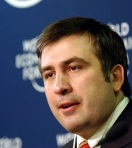While Georgia’s economy develops, and the country receives international accolades, systemic problems remain and deserve greater attention.
While many European countries struggle to rebuild and reform their failing economies, Georgia continues to make many envious. Awarded “Top Reformer of the World” in 2006 and 2008 by the World Bank, the country has experienced a strong and steady economic rise over the last decade.
After the Rose Revolution in 2003 Mikheil Saakashvili’s government undertook a number of liberal economic reforms aimed at consolidating Georgia’s transition from a state-led to a market economy. The results speak for themselves: Georgia now enjoys a low rate of inflation, a high level of public investment, and a dynamic growth rate of 6-7% in 2011-2012, despite the global economic downturn and sluggish growth with its major European partners. While the European Union continues to promote and supervise Georgia’s reforms for potential membership, Georgia appears to be Europe’s model child.
To achieve these results Georgian leaders have had to tackle many problems hampering economic development since the fall of communism. Corruption has been combatted intensely, and while there remains a long way to go in this domain, progress is indisputable. From 2003 to 2012, the country rose from 124th up to the 51st rank on Transparency International’s Corruption Index. Together with other reforms aimed at reducing the Georgia’s structural deficit and improving local infrastructure, this evolution has made the economic environment far more favourable to investment.
And indeed, these efforts have yielded rewards. Net inflows amounted to $1.154 billion in 2011, and this year Georgia ranked in 9th place in terms of the ease of doing business. Many international observers have praised the results brought by neoliberal reforms in the country, which begs the question of whether or not there is a “Georgian Model” for liberalization.
President Saakashivili has made Georgia reformer of the year repeatedly, but the benefits are not reaching his people.
Nevertheless, some wonder whether the government is drawing excessive attention to its stock of bright rankings and data to attract foreign investment, rather than improving the daily lives of its citizens. Beneath this “top reformer” label are features of the economy not nearly as positive. Unemployment remained at an average of 15% over the period 2007-2011, and the poverty rate also remains very high, reaching 24.7% in 2009. This in spite of the presence of poverty reduction programs.
Considering investment, there are certain flaws in the success story as well. The judicial system is not well developed and does not perform well. The bankruptcy law, for instance, remains quite rudimentary. The same World Bank report placed Georgia 81st in the world for resolving insolvency cases. Moreover, while Saakashvili’s government has been keen to encourage and promote the establishment of large enterprises, it has failed to create an environment favourable to small and medium-sized enterprises (SMEs) and independent workers. These types of businesses are critical to building a strong and self-sustainable economy in the long-run.
This points to a distinct vulnerability of the Georgian economy. Because the rate of savings and private investment remains quite low, the country’s balance of payment and investment programs are heavily dependent on external sources. That economic growth relies mainly on credits and FDI may deepen and protract downturns in times of crisis. The important role of remittances from the Georgian diaspora is also reflective of this external dependence. A 2007 NATO Parliamentary Assembly Report highlights the fact that approximately 20-30% of the Georgian labour force works abroad, with their remittances account for nearly 7% of GDP. Additionally, most of these workers live in Russia. It goes without saying then that stability in Georgia-Russian relations is important to stability in the Georgian economy.
So far the country has proved to be quite resilient, rapidly recovering from the double shock of the war with Russia and the financial crisis in 2008. In the long-term however, this must be addressed. The new Prime Minister Bidzina Ivanishvili, elected last October, seems to take these issues seriously. He insisted on the need to invest in the agricultural sector, which is a real comparative advantage for the country and could help to ameliorate the current account deficit by boosting exports. An improved relationship with Russia should also help in that regard.
The new government has also committed itself to tackling poverty and unemployment, supporting SMEs, and reforming the judiciary. Apart from these declarations, however, it seems that so far the new government has not done better than its predecessors in improving these important indicators.
Georgia has huge and undeniable potential, but it faces problems that are complex and cannot be solved overnight. While it remains a viable investment opportunity in the short to medium term, its weaknesses have to be addressed in order to build a strong and healthy economy in the long-run. Thus far, the country proved keen to engage in reforms and improve the investment climate. The coming period will be a crucial indicator of if it will continue on this track.











